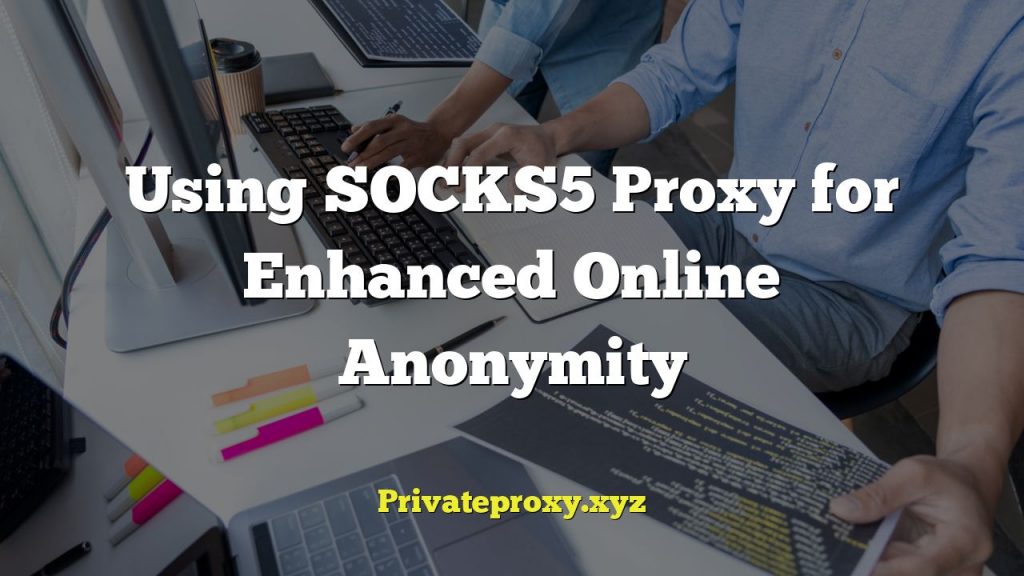
“`html
Introduction to Secure Cryptocurrency Trading via Proxy
The world of cryptocurrency trading is rife with opportunities for profit, but it’s also a hotbed for cyber threats. From phishing scams and malware to Distributed Denial-of-Service (DDoS) attacks and exchange hacks, traders face a constant barrage of risks that can jeopardize their funds and personal information. One method gaining traction among security-conscious traders is the use of proxies. A proxy server acts as an intermediary between your computer and the internet, providing a layer of security and anonymity that can significantly reduce your exposure to these threats. This article delves into the benefits, considerations, and best practices for secure cryptocurrency trading using proxies.
Understanding Proxy Servers
A proxy server is essentially a computer that sits between your device and the internet. When you use a proxy, your internet traffic is routed through the proxy server, which then forwards it to the destination website or service. This process offers several advantages:
- IP Address Masking: Your actual IP address is hidden, making it difficult for websites and hackers to track your location and identify your device. The destination server only sees the IP address of the proxy.
- Enhanced Anonymity: By masking your IP address, a proxy helps protect your privacy and makes it harder for third parties to monitor your online activity.
- Access to Geo-Restricted Content: Proxies can be used to bypass geographical restrictions and access cryptocurrency exchanges or services that may be unavailable in your region.
- Improved Security: Proxies can act as a buffer between your device and the internet, filtering malicious traffic and preventing direct attacks.
- Load Balancing and Caching: Some proxy servers can distribute traffic across multiple servers or cache frequently accessed content, improving performance and reducing bandwidth consumption.
Types of Proxy Servers
There are various types of proxy servers, each offering different levels of security and anonymity. Understanding these differences is crucial for choosing the right proxy for your cryptocurrency trading needs.
- HTTP Proxies: These are the most basic type of proxy and are designed for web browsing. They are generally not suitable for cryptocurrency trading, as they do not encrypt your traffic and are easily detected.
- HTTPS (SSL) Proxies: These proxies encrypt the traffic between your device and the proxy server, providing a higher level of security than HTTP proxies. However, they may still leak some information about your connection.
- SOCKS Proxies: SOCKS proxies are more versatile than HTTP/HTTPS proxies and can handle various types of traffic, including those from cryptocurrency trading platforms. They provide a higher level of anonymity and security, making them a better choice for trading. SOCKS5 is the latest version and is generally recommended.
- Transparent Proxies: These proxies do not hide your IP address and are often used for monitoring and filtering internet traffic. They are not suitable for secure cryptocurrency trading.
- Anonymous Proxies: These proxies hide your IP address but identify themselves as proxies. While they offer some level of anonymity, they are less secure than elite proxies.
- Elite (High Anonymity) Proxies: These proxies not only hide your IP address but also do not identify themselves as proxies. They offer the highest level of anonymity and security, making them the best choice for sensitive activities like cryptocurrency trading.
- Residential Proxies: These proxies use IP addresses assigned to real residential users, making them more difficult to detect and block than datacenter proxies. They are often used for tasks that require a high level of trust, such as accessing cryptocurrency exchanges.
- Datacenter Proxies: These proxies use IP addresses assigned to datacenters. They are generally cheaper and faster than residential proxies, but they are also more likely to be detected and blocked by websites and exchanges.
- Rotating Proxies: These proxies automatically change your IP address at regular intervals, making it even more difficult to track your online activity. They are often used in conjunction with residential or datacenter proxies.
Benefits of Using Proxies for Cryptocurrency Trading
Using proxies for cryptocurrency trading offers several key benefits, enhancing both security and privacy:
- Protection Against DDoS Attacks: By masking your IP address, a proxy can protect you from Distributed Denial-of-Service (DDoS) attacks, which can disrupt your trading activities.
- Prevention of IP Tracking and Geolocation: Proxies prevent cryptocurrency exchanges and other websites from tracking your IP address and determining your location, protecting your privacy.
- Bypassing Geo-Restrictions: If a particular cryptocurrency exchange is not available in your region, you can use a proxy server located in a supported country to access it.
- Reduced Risk of Account Suspension: Some cryptocurrency exchanges have strict rules about using VPNs or proxies. Using a reliable and high-quality proxy can help you avoid account suspension.
- Enhanced Security Against Phishing and Malware: A proxy server can act as a buffer between your device and the internet, filtering out malicious traffic and preventing phishing attacks.
Choosing the Right Proxy for Cryptocurrency Trading
Selecting the appropriate proxy server is crucial for ensuring the security and effectiveness of your cryptocurrency trading activities. Consider these factors when making your choice:
- Security Level: Opt for SOCKS5 or HTTPS proxies for the highest level of security. Avoid HTTP proxies, as they do not encrypt your traffic.
- Anonymity Level: Choose elite (high anonymity) proxies that do not identify themselves as proxies. This will provide the best protection against tracking.
- Proxy Type: Consider residential proxies for tasks that require a high level of trust, such as accessing cryptocurrency exchanges. Datacenter proxies can be used for less sensitive tasks.
- Proxy Speed and Reliability: Ensure that the proxy server is fast and reliable. Slow or unreliable proxies can disrupt your trading activities. Test the proxy speed before committing to a long-term subscription.
- Proxy Location: Choose a proxy server located in a country where the cryptocurrency exchange you want to access is supported.
- Proxy Provider: Select a reputable proxy provider with a proven track record of providing high-quality proxies. Read reviews and compare pricing before making a decision.
- Rotating Proxy Option: Consider using rotating proxies to further enhance your anonymity and security.
Best Practices for Secure Cryptocurrency Trading with Proxies
Even with a reliable proxy server, it’s essential to follow best practices to maximize your security and protect your funds:
- Use a Strong Password: Always use a strong and unique password for your cryptocurrency exchange accounts and other online services.
- Enable Two-Factor Authentication (2FA): Enable two-factor authentication (2FA) on all your cryptocurrency exchange accounts to add an extra layer of security.
- Keep Your Software Updated: Keep your operating system, web browser, and other software updated to the latest versions to patch security vulnerabilities.
- Use a Reputable Cryptocurrency Exchange: Choose a reputable cryptocurrency exchange with a strong security track record. Research the exchange’s security measures and read reviews before depositing any funds.
- Be Wary of Phishing Attacks: Be cautious of phishing emails, messages, and websites that try to trick you into revealing your login credentials or private keys. Always verify the authenticity of any communication before providing any sensitive information.
- Use a Hardware Wallet: Store your cryptocurrency in a hardware wallet for maximum security. Hardware wallets are physical devices that store your private keys offline, making them immune to hacking.
- Monitor Your Account Activity Regularly: Monitor your cryptocurrency exchange accounts regularly for any suspicious activity. Report any unauthorized transactions or account changes immediately.
- Use a VPN in Conjunction with a Proxy: Consider using a VPN (Virtual Private Network) in conjunction with a proxy for an added layer of security. A VPN encrypts all your internet traffic, protecting it from eavesdropping.
- Test Your Proxy Connection: Before using a proxy for trading, test it to ensure it is working correctly and providing the desired level of anonymity. Use online tools to check your IP address and location.
- Avoid Free Proxies: Avoid using free proxy servers, as they are often unreliable, slow, and may be used for malicious purposes. Invest in a paid proxy service for better security and performance.
Setting Up a Proxy for Cryptocurrency Trading
The process of setting up a proxy server varies depending on your operating system, web browser, and cryptocurrency trading platform. Here’s a general overview of the steps involved:
- Obtain Proxy Server Details: Purchase a proxy server from a reputable provider. You will receive the proxy server’s IP address, port number, username, and password.
- Configure Your Web Browser: Most web browsers allow you to configure proxy settings. In Chrome, you can find the proxy settings under Settings > Advanced > System > Open your computer’s proxy settings. In Firefox, you can find the proxy settings under Options > General > Network Settings > Settings.
- Configure Your Cryptocurrency Trading Platform: Some cryptocurrency trading platforms have built-in proxy settings. If your platform supports proxies, enter the proxy server details in the appropriate fields.
- Verify Your Proxy Connection: After configuring the proxy settings, verify that your connection is routed through the proxy server. Use an online tool to check your IP address and location.
Potential Drawbacks of Using Proxies
While proxies offer numerous benefits, it’s important to be aware of their potential drawbacks:
- Speed and Performance: Using a proxy server can sometimes slow down your internet connection, especially if the proxy server is located far away or is overloaded.
- Cost: High-quality proxy services can be expensive, especially if you need a large number of proxies or residential proxies.
- Complexity: Setting up and configuring a proxy server can be technically challenging for some users.
- Trust Issues: You are entrusting your internet traffic to the proxy server provider. It’s important to choose a reputable provider that you trust.
- Risk of Detection: Some websites and cryptocurrency exchanges may be able to detect and block the use of proxies, even if you are using a high-quality proxy service.
Conclusion
Secure cryptocurrency trading via proxy offers a valuable layer of protection against various online threats. By masking your IP address, enhancing your anonymity, and filtering malicious traffic, proxies can significantly reduce your risk of being targeted by hackers and scammers. However, it’s crucial to choose the right type of proxy, follow best practices, and be aware of the potential drawbacks. By taking these precautions, you can enjoy a safer and more secure cryptocurrency trading experience.
“`


